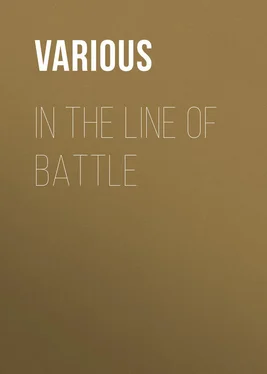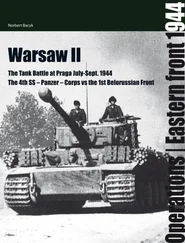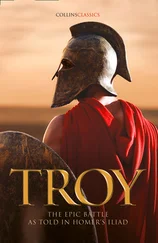Various - In the Line of Battle
Здесь есть возможность читать онлайн «Various - In the Line of Battle» — ознакомительный отрывок электронной книги совершенно бесплатно, а после прочтения отрывка купить полную версию. В некоторых случаях можно слушать аудио, скачать через торрент в формате fb2 и присутствует краткое содержание. Жанр: История, prose_military, Биографии и Мемуары, на английском языке. Описание произведения, (предисловие) а так же отзывы посетителей доступны на портале библиотеки ЛибКат.
- Название:In the Line of Battle
- Автор:
- Жанр:
- Год:неизвестен
- ISBN:нет данных
- Рейтинг книги:4 / 5. Голосов: 1
-
Избранное:Добавить в избранное
- Отзывы:
-
Ваша оценка:
- 80
- 1
- 2
- 3
- 4
- 5
In the Line of Battle: краткое содержание, описание и аннотация
Предлагаем к чтению аннотацию, описание, краткое содержание или предисловие (зависит от того, что написал сам автор книги «In the Line of Battle»). Если вы не нашли необходимую информацию о книге — напишите в комментариях, мы постараемся отыскать её.
In the Line of Battle — читать онлайн ознакомительный отрывок
Ниже представлен текст книги, разбитый по страницам. Система сохранения места последней прочитанной страницы, позволяет с удобством читать онлайн бесплатно книгу «In the Line of Battle», без необходимости каждый раз заново искать на чём Вы остановились. Поставьте закладку, и сможете в любой момент перейти на страницу, на которой закончили чтение.
Интервал:
Закладка:
I obeyed – glorious it was to hear that challenge in my native tongue, after what we had gone through. Then this good English sentry said, “Come up and be recognised!” not quite according to the regulation challenge, but good enough – and he had seen us quite clearly in the moonshine.
Up I went, and found myself face to face with the sentry, whose rifle was presented ready for use, and whose bayonet gleamed in the cold light.
“What are you doing?” said the sentry. “Are you burying the dead?”
I saw that he was sentry over a trench, and I went to the top of it and leaned over the parapet and said, “Can you give me a hand?”
“What’s up?” said the sentry, who did not seem to realise what had actually happened – and how could he, in such a strange affair?
“I’ve got a chap out here wounded,” I told him, “and I’ve dragged him down the hill on a shovel.”
The sentry seemed to understand like a flash. He walked up to the trench, and when I had made myself clear, three or four chaps bustled round and got a blanket, and I led them to the spot where I had left Andrews lying on the ground. We lifted him off the shovel, put him on the blanket, and carried him to the trench. These men were, I think, Inniskilling Fusiliers, and they did everything for us that human kindness could suggest. They gave me some rum and bully beef and biscuit, and it was about the most delightful meal I ever had in my life, because I was famishing and I was safe, with Andrews, after those dreadful hours on the hillside, which seemed as if they would never end.
When we had rested and pulled round a bit, we were put on stretchers and carried to the nearest dressing-station. Afterwards we were sent to Malta, where Andrews is, I believe, still in hospital.
The granting of the Victoria Cross for what I had done came as a complete surprise to me, because it never struck me that I had done more than any other British soldier would have done for a comrade.
I never lost heart during the time I was lying on Hill 70. All the old things came clearly up in my mind, and many an old prayer was uttered, Andrews joining in. We never lost hope that some way out of our peril would be found – and it seemed as if our prayers had been answered by giving us this inspiration of the shovel.
CHAPTER II
A PRISONER OF WAR IN GERMANY
[For nine weary months, including the whole of an uncommonly bitter winter, the teller of this story, Corporal Oliver H. Blaze, 1st Battalion Scots Guards, was a prisoner of war in Germany. Corporal Blaze was on outpost when he was severely wounded and captured, and his subsequent experiences give proof that in this momentous struggle we are fighting a people who are incapable of understanding the laws of honourable combat, and who, in the interests of humanity and civilisation, must be crushed. Corporal Blaze is a fine type of the splendid Guardsmen who have done so much in this great war to add to their own glory and the noble reputation of the British Army.]
I hardly know where to begin my story, but perhaps I might start with a little tale of an air fight, because a night or two ago I happened to be in the streets when German airships raided London, and I could not help recalling the difficulty of hitting even a huge object like a Zeppelin in the night-time.
In the early days of September 1914, when we had got used to fighting, the battalion was on the march when a German aeroplane, decorated with two Iron Crosses, was sighted. At that time we were more than a thousand strong, and the lot of us opened fire with our rifles, rattling away with rapid fire, so that we soon accounted for about fifteen thousand rounds. At the same time another battalion not far away was on the job, so that a perfect fusillade was going on. The firing was tremendous, but it seemed as if the machine would not be touched. At last, however, the aeroplane was brought down, the observer being dead and the other man severely burnt and wounded. I do not know whether it was our battalion or the other which got the machine; but I called to mind the great difficulty of hitting an aircraft when I watched the raid on London. I was walking along, too pleasantly occupied to be thinking of war, and did not know of the affair until I reached a street corner and saw the people craning their necks skywards, watching the airship and the shells that were bursting under it.
Mons, Cambrai, the Marne and the like make an old, old story by this time, so I will get on to the tale of my nine months’ captivity in Germany, as a prisoner of war.
It is common knowledge now that the Germans never lost a chance of trying to do something by treachery and trickery and not playing the game. Killed and wounded English soldiers were robbed of their coats by the Germans, who took them for their own use; and dressed in these coats the enemy on several occasions tried to get near us, to their heavy cost, when we got accustomed to the dodge.
One day, early in September, not long after we had gone out with the Expeditionary Force, a German machine-gun brigade came along, dressed in our uniform. We thought they were reinforcements, so we let them get very close and they occupied a ridge on our left. Ten minutes afterwards they opened fire on us; but our garrison artillery soon shifted them with sixty-pounders. The Germans killed a lot of the Coldstreams that day by this trick.
It was not long after this that we had one of those experiences which have been so often known in this great war. We were marching along in brigade column, with the Black Watch or Coldstreams, I am not sure which, leading. We were going through an area which had been reported all clear, and had got to a bend in the road, when the Germans started shelling us. It was one of those swift happenings which cannot be avoided in such a war as this, and before we fully realised what was taking place, a shell had burst and killed four stretcher-bearers of the Coldstreams, the N.C.O. who was in charge, and a wounded man who was being carried on a stretcher; and the same shell wounded a man in our front section of fours. That one shell did a fair lot of havoc, and it was quickly followed by several more; but these did not do much mischief.
What struck me most in this little affair was the coolness of our C.O., Colonel Lowther, now a brigadier-general. He personally conducted every company from the left of the road into a ditch on the right of the road.
“Keep cool, men,” he said, “and come this way.” And we did keep cool, for the colonel took the direction of everything, in spite of the shelling, just as calmly as if he was carrying out a battalion parade at home – a really wonderful performance at a time like that, and one which completely steadied the lot of us, though we had got pretty well used to things.
But the Germans did not have a look in for long, for the Kilties got hold of the gunners and chased them off. I did not see much of it, except in the distance; but we heard the shouting as the Jocks got to work with their bayonets.
As we were going along the road we saw where the Germans had put out of action a whole battery of our artillery which was standing at the side of the road. The weather was dull and it started to drizzle, so that it was not easy to distinguish troops. While the battery was being knocked out some of our fellows – the Loyal North Lancashire, I think – were advancing across a field. To protect themselves from the rain they had covered themselves with their waterproof sheets. Seeing them, and not being able to tell who they were, but believing them to be Germans, our gunners opened fire on them; but what damage they did I don’t know. That was another of those things that will happen in war, and it could hardly be helped, for about this time it was a common dodge of the Germans to disguise themselves in British uniforms and attack us before we could tumble to the trick.
Читать дальшеИнтервал:
Закладка:
Похожие книги на «In the Line of Battle»
Представляем Вашему вниманию похожие книги на «In the Line of Battle» списком для выбора. Мы отобрали схожую по названию и смыслу литературу в надежде предоставить читателям больше вариантов отыскать новые, интересные, ещё непрочитанные произведения.
Обсуждение, отзывы о книге «In the Line of Battle» и просто собственные мнения читателей. Оставьте ваши комментарии, напишите, что Вы думаете о произведении, его смысле или главных героях. Укажите что конкретно понравилось, а что нет, и почему Вы так считаете.












